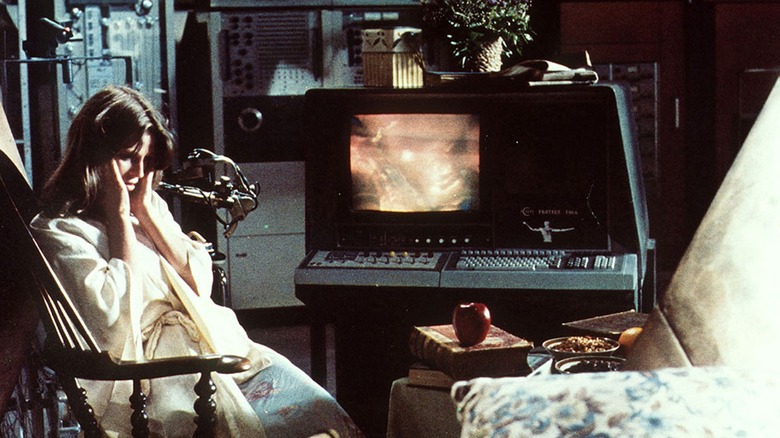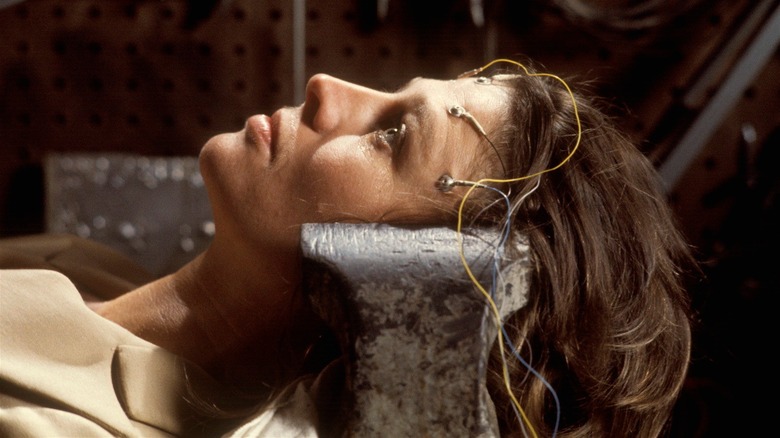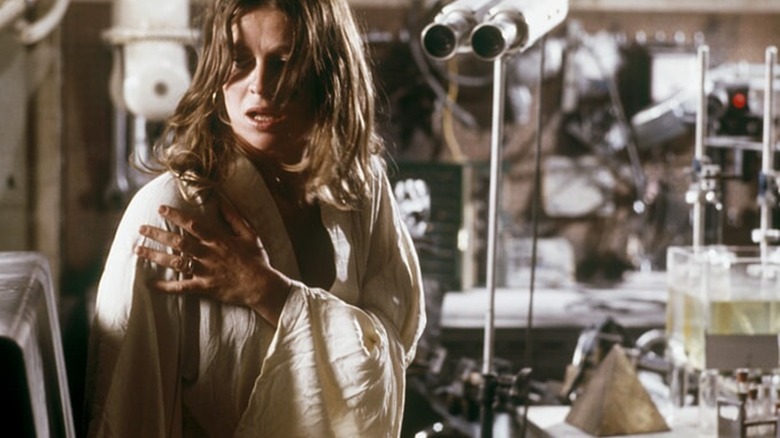This Dean Koontz Sci-Fi Film Might've Been A Cult Classic If Not For MGM
When Donald Cammell's techno-horror "Demon Seed" crept into theaters in 1977, critics were not impressed. From being described as utterly nonsensical to being viciously torn apart as a film with no right to exist, "Demon Seed" was mostly reviled as unwatchable garbage that relied on flagrant shock value to capture audience attention.
Today, the film's critical reappraisal does not quite elevate "Demon Seed" into a cult classic but does approach it with a more balanced lens, where there is some value to be found in its social commentary about technological singularity and the uprooting of female autonomy. Cammell's film is an uncomfortable look into the extent to which those in power wish to control bodily autonomy — a theme that feels especially poignant now. Apart from this, "Demon Seed" also underlines the horrifying extremes of unchecked artificial intelligence, and how it preys on those it perceives as easily exploitable.
Despite being jampacked with ideas and themes that would make for electrifyingly poignant sci-fi, "Demon Seed" is still, on many levels, a deeply ridiculous experience. Julie Christie, who plays Susan, the focal point of the film, does her best to root the film in empathy and genuine emotion, but the events surrounding her feel so logic-defying that it often undercuts Christie's earnest efforts. These flaws feel more pronounced when compared to Dean Koontz's "Demon Seed" — the book Cammell's film is based on — as Koontz's story about a machine's evolved consciousness hell-bent on "procreating" contains some chilling ideas worth exploring. So, what exactly went wrong with the adaptation?
Well, in an interview with David Del Valle, Cammell revealed how last-minute studio interference directly stunted the film's potential and morphed it into a pale shadow of what it could have been.
How MGM botched a potential sci-fi classic
Although "Demon Seed" does not feel too outlandish by contemporary standards (purely due to the merit of resonant core ideas), the concept was a hard sell during the time of its release. Cammell had previously co-directed the then-controversial, now-highly regarded "Performance" with Nicolas Roeg, so his foray into experimental sci-fi felt promising, as he had little luck with a dozen unrealized projects before "Demon Seed" released in theaters. However, the film was not a career-booster for Cammell, as it was a "very unhappy experience" that was exacerbated by MGM:
"Well, it was a very unhappy experience. It was a pretty frustrating experience. My personality just does not gel with these studio people. And MGM was no different than Warner Bros.. was with 'Performance.' I was the reason they got Julie Christie, who was red hot at the time, and an Oscar winner to boot. The front office loved everything until they got their hands on my rough cut. It could have been a great film, but even though it got bloody respectable notices, it wasn't my vision."
Getting robbed of one's directorial vision due to studio interference is a damn shame, and even though Cammell does not specify what happened, it is clear that the final cut did not make him happy. Koontz himself provides us with more insight into the marketing blunders that MGM committed, detailing the studio's genre mishandling on his website:
"In the end, the studio released 'Demon Seed' with a stealth advertising budget. Before release, it changed the initially classy poster and the stylish newspaper ads into a sleazy minimalist campaign ... The studio said they needed to keep the advertising budget low because this was a science-fiction movie, and late in the game they realized science-fiction movies never made money."
Why the Dean Koontz novel deserved more
Koontz's experience with the adaptation of his book was not pleasant, and he believes that MGM completely misunderstood the film's tone and intent, marketing it as a sleazy psychosexual experience that was completely removed from heady sci-fi ideas. Sure, science fiction can incorporate provocative sleaze, but the film's handling of these themes (at least in the version that made the final cut) further alienated itself from a logical core, and squandered most of its inherent depth due to poor execution.
This is rather unfortunate, as Koontz's book — the original 1973 version — packs a serious punch, where the viscerally aggressive nature of the AI, Proteus, masterfully conveys the inevitable urge of the power-hungry, be it man or machine, to play god.
Proteus echoes some sadistic characteristics of AM from Harlan Ellison's 1967 short story "I Have No Mouth, and I Must Scream," where an AI entrenched in hatred for humanity tortures the only five humans on Earth after the collapse of civilization to unforgivable extremes. While Proteus is not as morally complex or emotionally driven as AM, this machine is abusive and controlling, flitting between manipulation and violence to accomplish what it wants. Although Koontz has rewritten parts of the story over time to incorporate dark humor, pepper contemporary pop culture references, or refine his ideas, the original version remains raw and terrifying, and an adaptation focusing on these tenets would undoubtedly be an intriguing one.
While Cammell's "Demon Seed," which is still an underrated sci-fi experience, could have been a completely different film if MGM had understood its artistic intent, this "what-if" unfortunately remains a wishful fever dream.


